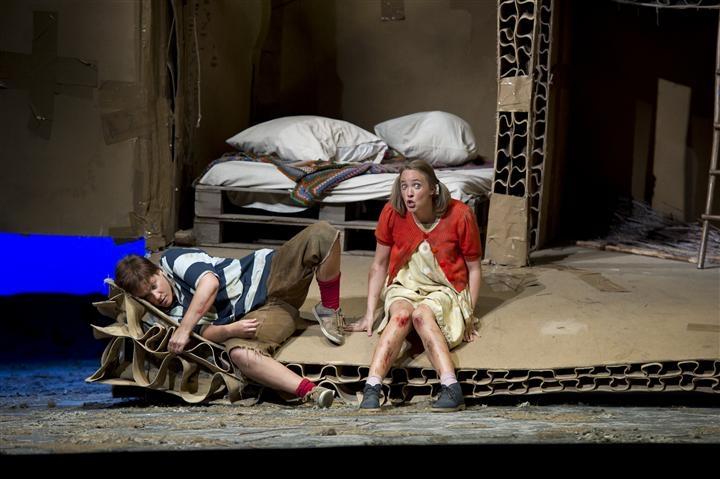Glyndebourne’s Hänsel und Gretel comes in a large cardboard box, with plain brown wrapper, duct-tape and a barcode. There’s a public health warning, too: sugar and spice and all things nice come at a price. The evil witch Rosina Sweet-Tooth is nothing more, nothing less than rabid consumerism masquerading as a smart lady in a pink two-piece suit. Yes, Laurent Pelly’s 2008 staging was/ is the first environmentally aware Humperdinck. It had to come. For revival read recycle.
Pelly’s production is much improved since its first outing. The darkness of this piece has always been buried deep beneath the wistfulness and luminosity of its music; Pelly merely adds a healthy dash of irony and cynicism. The Dream Pantomime, hopelessly unclear in 2008, is now properly the heart of his conception with a group of impeccably clean happy children, all crisp whites and party frocks – the so-called “guardian angels” of hapless Hänsel and Gretel - gorging on hamburgers while their frightened charges sleep on empty stomachs. The haves and the have-nots. The ugly twist here is that once their curiosity is exhausted the little darlings simply up and disappear, discarding their junk food wrappers and leaving Hänsel and Gretel to the elements. How boldly that image plays against the sweet consolation of the music.
That music is lovingly attended by the London Philharmonic Orchestra, Ticciati ever mindful of its Wagnerian colorations and invigorating rhythmic swagger. He has an especially talented cast to work with: Lydia Teuscher, a vibrant-voiced Gretel and, physically and vocally, a brilliant foil to Alice Coote’s deliciously rough and tumble Hänsel – the kind of ungainly lad who looks like he’s about to be slapped with an ASBO. How touching it is when all that playful contrast finds exquisite intimacy and two-part close harmony in their evening prayer. You can imagine them turning into their parents: the big-voiced Imgard Vilsmaier and rough-hewn William Dazeley.
We first see Wolfgang Ablinger-Sperrhacke’s Witch in comic silhouette trying to achieve lift-off with a succession of inappropriate brooms and mops. The reality is rather more chilling with the pink-suited matriarch ripping off her matching pink-rinse wig to become a bald pot-bellied monster with a selection of boning knives to rival that of any hard-core slasher movie.
I’ll not reveal the secrets of the gingerbread house, except to say that even our collective best efforts during the dinner interval could not begin to match the calorific values on display here. As for the lost generation of children, would it surprise you to learn that Rosina Sweet-Tooth has mouth-watering obesity in mind? Never mind – the future’s bright, the future’s green.
- Hänsel und Gretel continues until 28 August
- See what's on at Glyndebourne 2010















Add comment